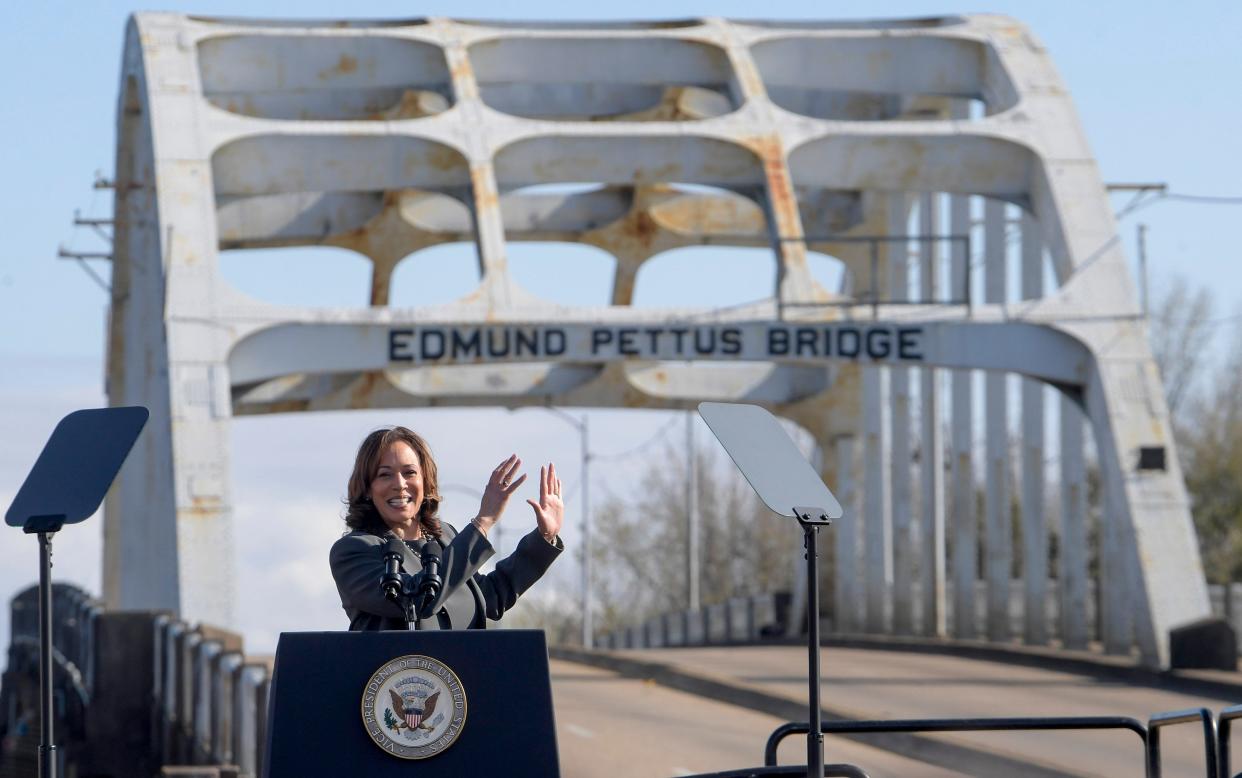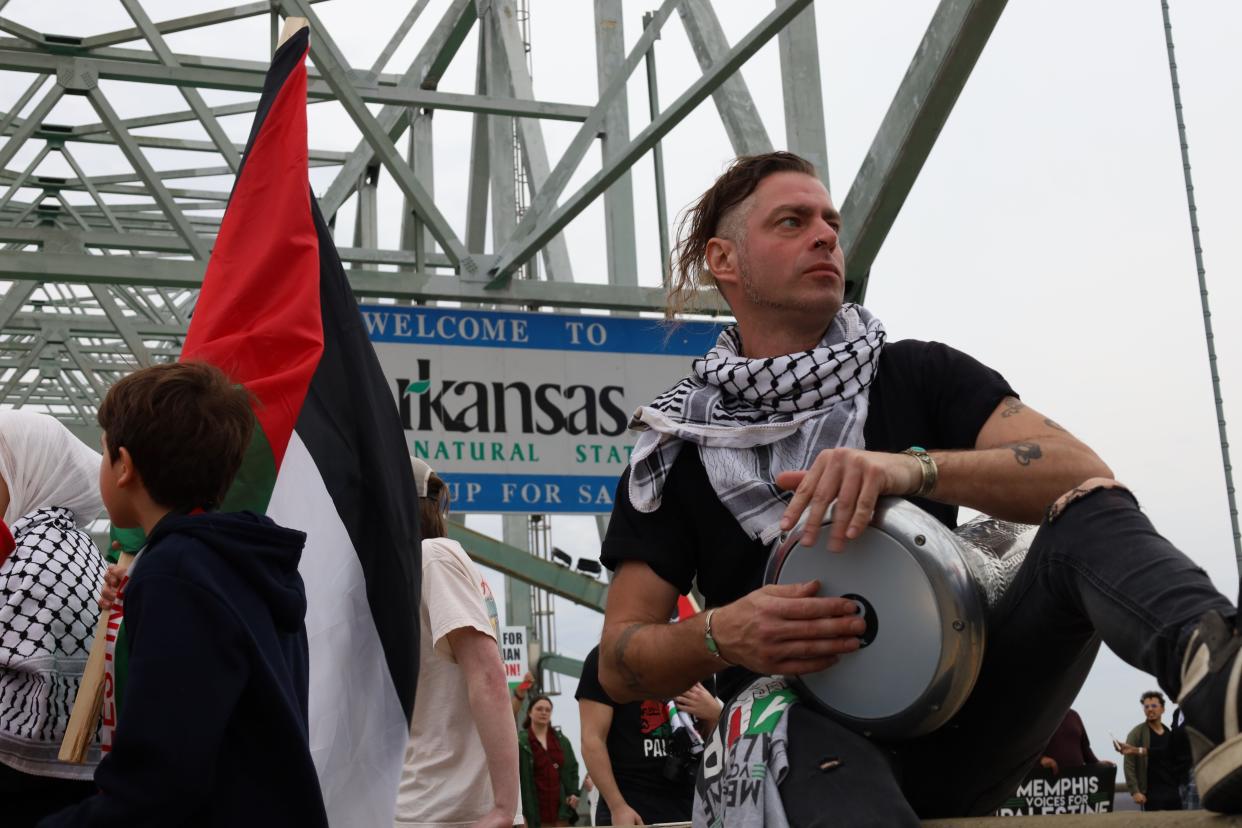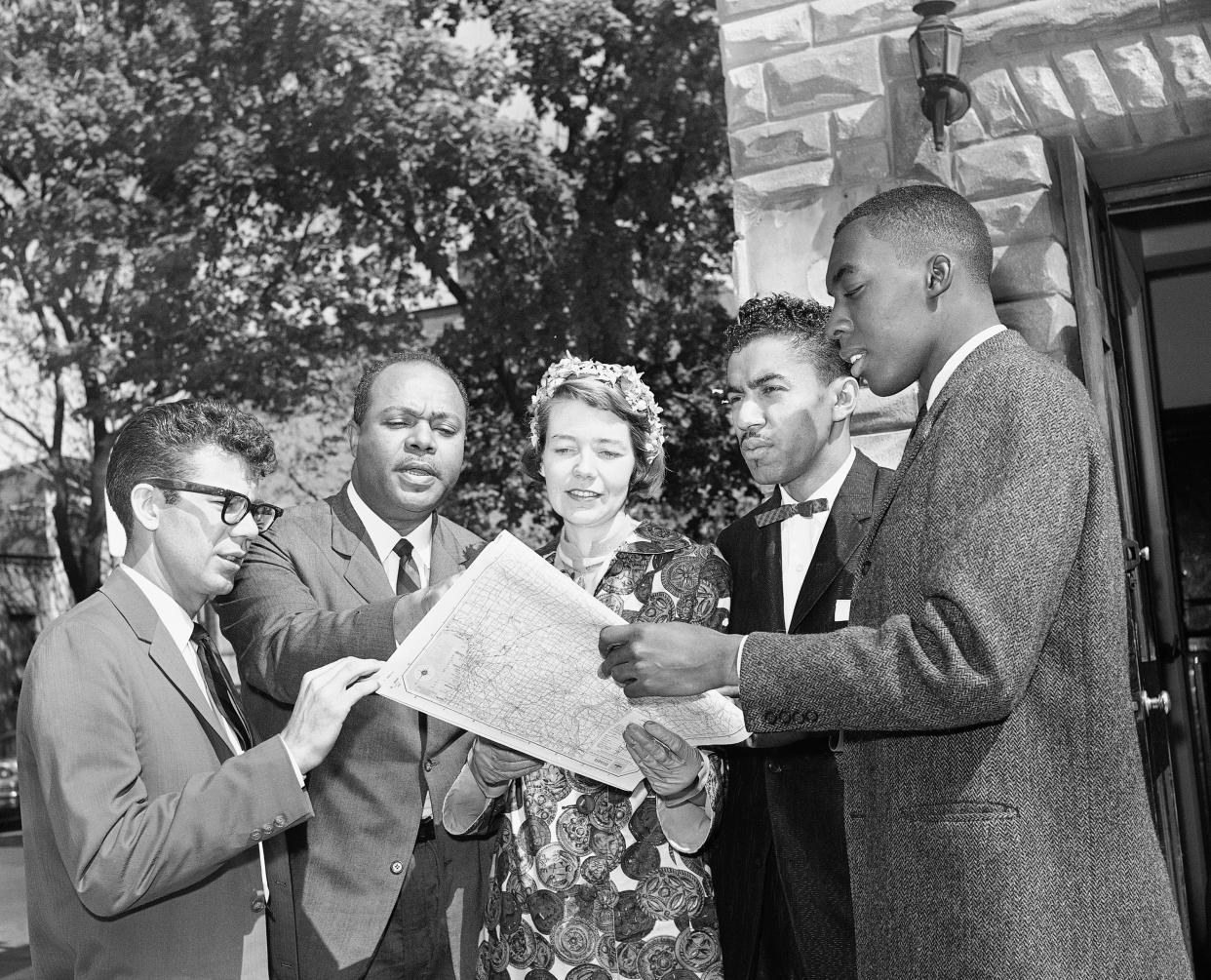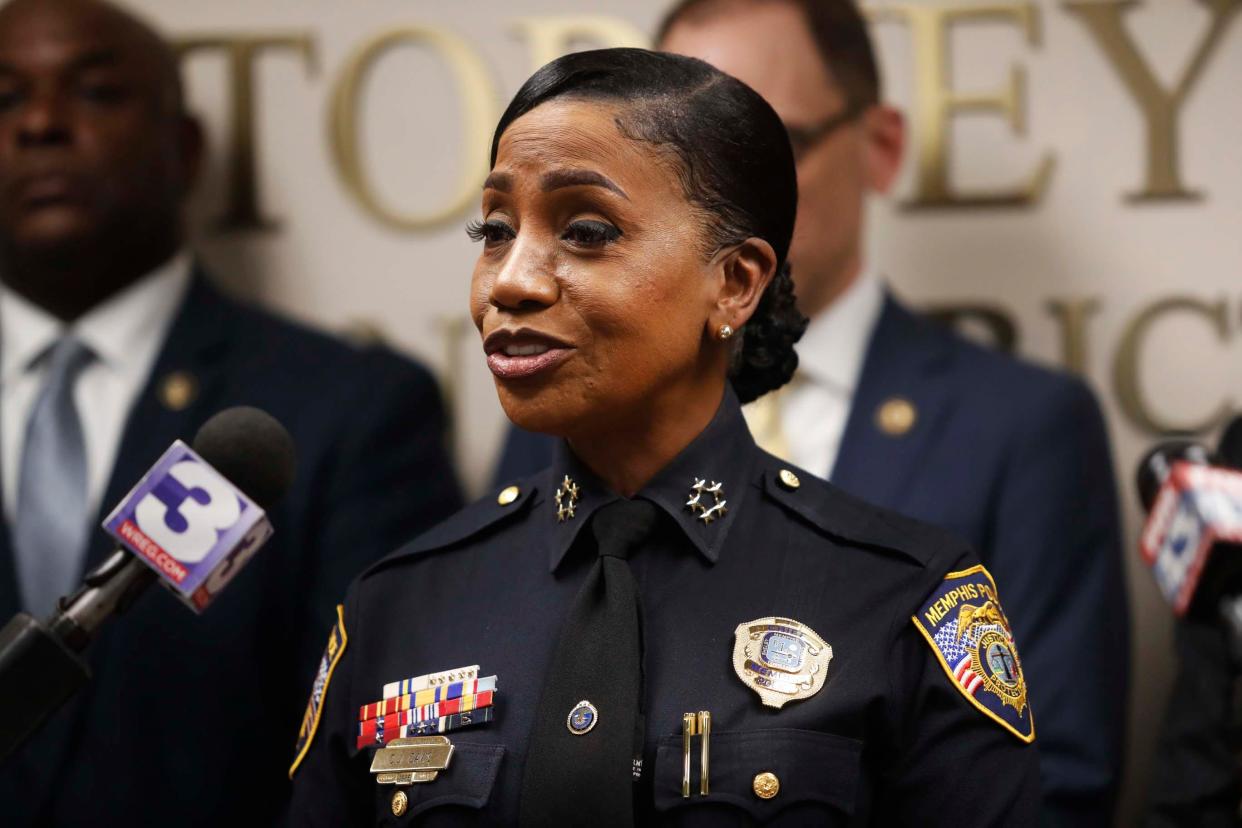Memphis Police Chief CJ Davis acted correctly to keep the peace during recent Gaza protest
Just recently, Vice President Kamala Harris paid homage to the brave civil rights protesters who 59 years ago marched on the Edmund Pettus Bridge in Selma, Alabama.
Vice President Harris led thousands in a peaceful walk across the bridge in the annual commemoration of what became known as Bloody Sunday.
On March 7, 1965, voting rights marchers led by a young John Lewis and Hosea Williams were viciously beaten by Alabama law officers as they attempted to cross the same bridge en route to Montgomery.
Black men, women and children were tear gassed and beaten with wooden clubs, whips, and rubber tubing. Though the protesters were violently forced back, they did not fight back.

It is worth noting that what happened that historic day on the Pettus Bridge 59 years ago was in stark contrast to how Memphis law officers more recently handled protesters on the bridges here.
Chief Davis did the opposite of what happened on Pettus Bridge
During the February 3, 2024, protest organized by Memphis Voices for Palestine and Palestinian Memphians, hundreds of protesters that included children and disabled individuals blocked traffic on the Hernando de Soto Bridge that connects Tennessee and Arkansas.

Activists called for a long overdue ceasefire in the ongoing Israel-Hamas conflict. When Memphis police told the protesters they were engaged in “unlawful assembly” and to leave the bridge, the crowd began to disperse. MPD had no physical contact with the protesters.
Undoubtedly, many travelers were inconvenienced by the highway being blocked. Yet, no one was hurt, no one was killed, no one was teargassed or tasered. It was a peaceful protest. And still, people were critical of Memphis Police Chief Cerelyn “CJ” Davis because she did not arrest the protesters. Though she handled the protesters correctly and with patience and professionalism.
The fact that no violent incidents occurred on the bridge speaks volumes for the integrity of Chief Davis and her police force. Any misjudgments by the police could have created chaos; any effort to disband the march could have had negative consequences.
Demonstrations can go awry in a heartbeat
In demonstrations such as that march, people are vulnerable to panic. That is where maintaining patience and professionalism is important, as well as appreciating the marchers’ individual rights.
It is my experience, and I have seen many marches and participated in some as well, disruptions can easily be misunderstood by those exercising their rights, and by others who feel the marchers are out of line when they are simply exercising their first amendment rights.
The First Amendment to the U.S. Constitution states: Congress shall make no law respecting an establishment of religion or prohibiting the free exercise thereof; or abridging the freedom of speech, or of the press; or the right of the people peaceably to assemble, and to petition the Government for a redress of grievances.
I personally know how a peaceful demonstration can go astray due to hotheaded police and other authorities making the wrong moves.
How the Supreme Court intervened in peaceful protest
In 1961, during my junior year at Southern University in Baton Rouge, Louisiana, I participated in a student march to protest the fact that Black people were not allowed to sit at lunch counters in downtown Baton Rouge. My younger brother, the late Shelby County Circuit Judge D’Army Bailey, helped to organize and lead the march with the Reverend B. Elton Cox.

As we marched along the highway from the university in the suburbs toward downtown Baton Rouge, we were confronted by the chief law enforcement officer and his crew with dogs and teargas.
When the chief ordered Reverend Cox to turn the march around, Reverend Cox replied: “My children, we are hungry! Let us continue to the lunch counters.” As we continued downtown, we were teargassed, and 23 student protesters were jailed. Somehow neither D’Army, Rev. Cox nor I was arrested.
The next day, Reverend Cox led 2,000 people in a peaceful protest across the street from the Baton Rouge courthouse where the students were jailed. Reverend Cox told the protesters they would leave the courthouse and proceed downtown to sit at segregated lunch counters. Reverend Cox was arrested the next day at a church and charged with criminal conspiracy, disturbing the peace, obstructing public passages, and picketing before a courthouse.
It was this case that went to the U.S. Supreme Court – Reverend Mr. B. Elton Cox v. Louisiana. In 1965 the Court held that a state government cannot employ “breach of the peace” statutes against protesters engaging in peaceable demonstrations that may potentially incite violence.
MLK returned to Memphis for the last time to demonstrate
In 1968 Dr. Martin Luther King Jr. led a march in Memphis streets in support the sanitation workers’ effort to unionize; that march experienced total disruption with the police using tear gas and batons.
I had the distinction of meeting Dr. King at his hotel later that day. Along with Louis Lucas, I provided Dr. King legal representation to challenge an injunction Memphis sought to prevent a second march. The second march required Dr. King to return to Memphis, and that resulted in his murder. Notwithstanding his murder, the second march occurred very peacefully with participants from across the nation.
Davis showed restraint throughout Tyre Nichols protesters
Here in Memphis, protesters demanding police reform in the Tyre Nichols case ended up on the I-55 bridge the night of January 27, 2023, after video footage was released of Nichols’ encounter with police that led to his death. I simply wanted to know what was going on so near my home, within a few hundred yards, when I found myself on the bridge in the middle of the protest thanks to an acquaintance with a golf cart. The leader of the march ended up at my house, where I connected her by telephone to then-Mayor Jim Strickland.
Again, the protesters eventually and peacefully moved off the bridge. There was no police presence on the bridge, and no teargas or provocation or arrests. To me, that’s verification that Chief Davis handled the protest correctly and effectively.

It was incumbent on the police department under Chief Davis’ leadership to assure the First Amendment principles were acknowledged and enabled, even though some of the First Amendment conduct may have put a strain on some of the officers. Yet, they were restrained by the police department’s standards of professionalism.
If Chief Davis had sent police officers to the bridges to break up the marches, people might have panicked, and the outcome could have been disastrous. Even with nominal injuries it would have been a disaster.
That is why I commend Chief Davis and the Memphis Police Department for how these two protests were handled. I am especially pleased that she and her officers respected the First Amendment rights held by those who protested, “the right of the people peaceably to assemble, and to petition the Government for a redress of grievances.”
We must be tough and bold within the Constitution
Parenthetically, those who sought the dismantling of the Scorpion police unit were eminently correct in seeking reform, but we must bear in mind that it was created as an extraordinary measure to address spiraling extraordinary and horrific crimes, including assaults and murders from gun violence that continue to plague and horrify our community.
These challenges require our law enforcement to constantly proceed to create and implement tough and bold measures within our Constitutional framework. These challenges also require a commitment to address and work toward eradicating the underlying causes of crime, such as income inequality, poverty, and systemic racial disparity regarding the availability of opportunities.
Finally, those who chose to march regarding the Israel-Gaza conflict are to be commended for having the courage and compassion with others throughout the world in expressing outrage at the genocidal suffering of the Palestinian people, and the destruction of their infrastructure in Gaza.
This grossly inhumane suffering will continue to go unabated in the absence of a cessation of our weapon support and also addition of the implementation of cease fire and permanent peace agreement, which of course would include the release of innocent hostages.
Attorney Walter Bailey Jr. served as Shelby County Tennessee commissioner for over 40 years.
This article originally appeared on Nashville Tennessean: Palestine protest: Memphis Police Chief CJ Davis made the right call
